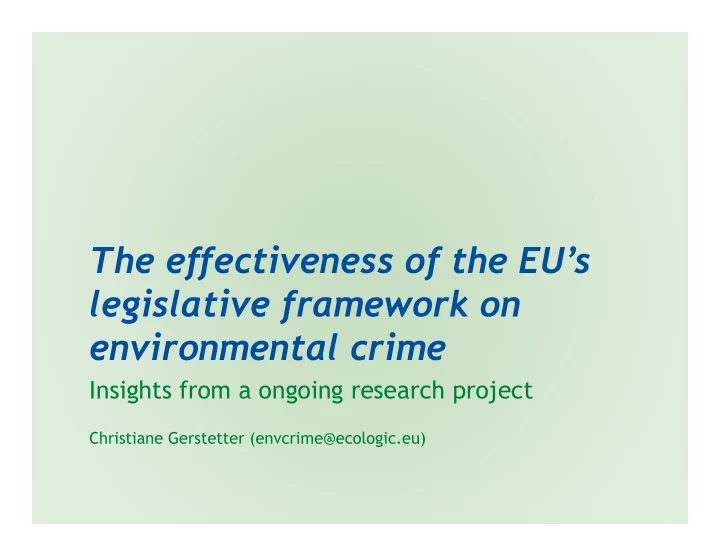

The effectiveness of the EU’s The effectiveness of the EU’s legislative framework on environmental crime Insights from a ongoing research project Christiane Gerstetter (envcrime@ecologic.eu)
The project …. EU-funded research project “European Union Action to Fight Environmental Crime” (EFFACE) Objective: Provide recommendations to EU Objective: Provide recommendations to EU on how to better combat environmental crime Interdisciplinary: law, economics, political science, criminology 11 partner institutions (ca. 25 researchers); 3,5 years; ends March 2016
Components Assessment of actors, instruments & institutions (country-related reports, reports on instruments oef EU legislation/international law; some assessment of their effectivness through interviews, analysis of police statistics etc.) Analysis of costs and impacts of environmental crime with EU focus: compilation and aggregation of existing data on specific type of environmental crime Case studies on different types of environmental crime, including a variety of methods (interviews, analysis of court cases/police records, observation, workshops etc) SWOT analysis of EU efforts to combat environmental crime So far seven workshops (+ one conference ) with academic experts and practitioners
Effectiveness Do measures taken by the EU and its Member States attain the objective of preventing and reducing environmental preventing and reducing environmental crime and thereby protecting the environment?
Standard framework for evaluating effectiveness Measure Output Outcome Impact
Framework applied to EU env crime Depends on definition of environmental crime Measure Environmental crime directive (core) Environmental directives Environmental directives dealing with behaviour that could severely damage the environment Environmental liability directive
Framework applied to EU env crime Transposition by Member States and enforcement Output Transpostion: rather OK Enforcement as measured by resources dedicated to it: difficult, no accessible data Problems with enforcement: lack of Problems with enforcement: lack of specialised bodies, political priority, resources, cooperation, lenient sentences But a lot of data missing & difficult to establish optimal level of efforts ex ante and in theory Conclusion: only partially effective
Framework applied to EU env crime Behavioural change: compliance Outcome Compliance is difficult to measure, so focus on non- compliance (criminal cases) Data: court cases/convictions Data: court cases/convictions (partially), sentences (partially), (partially), sentences (partially), seizures (e.g. wildlife crime, partially), police procedures – no aggregated EU data, reliability of data doubtful No long term trends could be identified
Framework applied to EU env crime Less environmental pollution/destruction Impact Lack of quantitative data on impact of environmental crime/illegal activities as opposed to legal activities (no data on to legal activities (no data on environmental crime in first environmental crime in first place, data sometimes available only at MS level, no distinction between legal/illegal activities) Data availability better in some areas in the EU: e.g. forest fires (database follwoing regulation at EU level)
Difficulties in assessing effectivness Effectiveness of current framework to combat environmnetal crime is very difficult to assess because of - Fragmented framework - Lack of data on actual crime committed (due to - Lack of data on actual crime committed (due to nature of criminal activity) - Lack of data on counter-measures taken (including e.g. sentences), partially because environmental crimes are not prosecuted - Lack of data on efforts invested in combatting environmental crime - Difficulty to interpret existing data
Factors likely to negatively affect effectiveness Lack of specialisation of enforcement bodies (police/prosecutors) in many Member States Lack of coordination between different authorities Lenient sentences Difficulties in transboundary cooperation Environmental crime no priority among police forces („victimless crime“) Regulatory framework sometimes perceived as difficult to implement and/or with some loopholes
Less relevant factors Transposition of environmental crime directive in Member States seems by and large OK Problem rather in enforcement Problem rather in enforcement (implementation) stage than in regulatory framework
Opportunities for EU action Keep environmental crime high on political agenda, e.g. through mentioning it in strategic documents (e.g. EAP , Europol SOCTA), providing funding Improve reporting and data gathering and exchange within EU Fund and support enforcement networks Fund measures of police and judicial cooperation (such as joint investigation teams) Provide capacity-building for enforcement officials and judges (including Provide capacity-building for enforcement officials and judges (including in local language) in local language) Help build database on sentences in environmental crime cases Build on good practices of some Member States, support cross-country policy learning Provide funding for environmental NGOs active on environmental crime Enhance role of Eurojust and define role of European Public Prosecutor Focus on observed weaknesses/problems with enforcement, hope that � addressing these will enhance effectiveness Focus on (but not limited to) deterrrence model �
Opportunities for EU action? Revise environmental crime directive concerning sanctions (minimum sanctions, type of sanctions) on basis of Art. 83 TFEU? Harmonise rules on inspection? Further harmonisation of legislative framework at EU level (e.g. harmonise terminology of environmental level (e.g. harmonise terminology of environmental liability directive and environmental crime directive)? Measures to enhance access to justice of NGOs/victims in cases of environmental crime? More stringent requirements on criminal liability of companies or civil liability for environmental crime committed by subsidiaries abroad?
How to stay tuned and contribute Take a look at our website (www.efface.eu) Follow us on twitter: Environmental Follow us on twitter: Environmental Crime @EnvCrime Expert workshop in London 22 October to discuss preliminary conclusions Final conference 17/18 February 2016 in Brusels
Recommend
More recommend